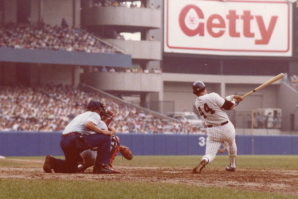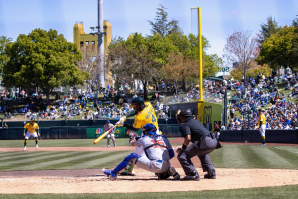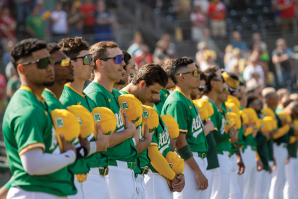It took only one Major League Baseball game, the sold-out opener at West Sacramento’s Sutter Health Park on March 31, for fans to experience first-hand the old adage that you never know what you might see at any given MLB game.
A perfect night for baseball at Sutter Health Park, Sept. 9,
against the Boston Red Sox.

With Chicago soundly beating the A’s in the eventual 15-3 win, Cubs catcher Carson Kelly came to bat in the top of the eighth inning needing a triple — a tough get for a catcher at any time — to complete the Cubs’ first cycle (single, double, triple, home run) since 1993. Kelly then banged a fastball off the centerfield fence that ricocheted back towards the infield enabling him to chug into third, getting him the rare feat (only 350 cycles have been recorded in MLB history).
Fans of Mike Trout get ready as the Trout-led Los Angeles Angels
prepare to take on the A’s at Sutter Health Park on Aug. 17.

With the historic first season of MLB in the Capital Region in the books, that rarity was just one memory during a season full of them after A’s owner John Fisher and local officials announced on April 4, 2024 that the franchise was relocating to West Sacramento for at least the next three years, sharing its park with the Triple-A Pacific Coast League River Cats, while the MLB team prepared for its planned move to Las Vegas in 2028.
A’s rookie Nick Kurtz launches a home run Aug. 17 against the
Angels, one of the 36 he hit in 2025.

Through all the challenges faced in the unprecedented 2025 season, there were 151 games played at an upgraded Sutter Health Park (including the Giants-River Cats exhibition March 23), 81 by the A’s, and 69 by the River Cats. Both the A’s and River Cats struggled through their season without making the playoffs, while a total of almost 1.1 million fans bought tickets.
“We’ve shown Sacramento the best baseball in the world, and that’s something cool to think about,” says Chip Maxson, president and COO of the River Cats, who is tasked with essentially overseeing all operations at Sutter Health Park and was recently named Minor League Baseball Executive of the Year.
“We’ve shown Sacramento the best baseball in the world, and
that’s something cool to think about,” says Chip Maxson,
president/COO of the River Cats, who is tasked with essentially
overseeing all operations at Sutter Health Park.

Based on the close to 15 A’s and River Cats games in 2025 this writer/photographer covered with a media credential, and another half-dozen with ticket in hand, here are a few observations and photo memories:
A’s attendance, high ticket prices and lack of ‘Sacramento spirit’
Before the season began, fans, team officials and local businesses all wondered how the A’s — and the minor league River Cats, who have called West Sacramento home since 2000 — would draw at the intimate 14,000-seat minor league Sutter Health Park. Sacramento Kings’ owner Vivek Ranadivé, who also owns the River Cats and Sutter Health Park, famously said at the news conference announcing the A’s move that they would feature “the most sought-after ticket in America,” sparking expectations that ended up not being met this year.
Boston Red Sox fans line up near the Sox’s dugout at Sutter
Health Park on Sept. 9.

The upgraded ballpark debuted during a sold-out River Cats-Giants exhibition on March 23, followed by a boisterous opening day packed house a week later. There were sellouts for the three-game sets with the New York Yankees (May 9-11) and the San Francisco Giants (July 4-6). Otherwise, attendance was noticeably underwhelming the rest of the year. The A’s featured a core of young, exciting players, but finished last among the 30 MLB teams in attendance, with an average of 9,487 tickets sold per game (in its final season at the Oakland Coliseum, the A’s were last with an average of 11,386).
The double duty Sutter Health Park grounds crew, which is
essentially the same group working both A’s and River Cats games,
are at work before the Sept. 9 game.

Before the season began, the A’s sold out their pre-season allotment of season tickets (estimated to be around 6,000). Demand seemed high, and a survey by Gametime listed Sacramento’s median ticket price at $181, the highest in baseball. Once the season started, however, fans, to the consternation of many season-ticket holders, quickly realized they could get most seats in the stadium through ticket sites like StubHub or SeatGeek in the $25-$30 range except on special giveaway nights.
Early on, the A’s were criticized for not officially referring to the team as the Sacramento A’s and not featuring “Sacramento” on team uniforms, other than a patch sporting the Tower Bridge, in addition to other slights like not allowing comments on their social media pages. In the meantime, the A’s aggressively promoted its impending move to Las Vegas and broke ground on the new stadium.
The A’s’ Tyler Soderstrom models the green and gold A’s shirt
with Sacramento lettering the team will be wearing periodically
throughout the 2026 season at Sutter Health Park. (Photo courtesy
of the A’s)

“I think they waited way too long to welcome themselves to Sacramento,” says season ticket holder Tom Sievwright of Roseville during the season finale on Sept. 28. He and his wife Karen attended 80 of the 81 home games, he says, and wondered if attendance might improve in 2026 if the A’s contend for a playoff spot. “We’ve enjoyed the whole season — we’re baseball fanatics — but they could have embraced the city a little sooner.”
Related: Excitement in Sacramento as the A’s Take the Field at Sutter Health Park
Sacramento’s Ana Sandoval, a lifelong A’s fan who had season tickets to the River Cats until they became the Giants’ affiliate in 2015, still attends River Cats games, but echoes the sentiment of many A’s fans who are bitter about the team leaving Oakland and says she won’t pay to watch them play until its owner sells the team.
“I will continue to sit on my couch and watch them — and you can ask my husband — I sit on my couch and I chant, ‘Let’s go Oakland,’ because that’s what I know, and that’s what it should be,” she says.
Two-time American League Most Valuable Player Aaron Judge, a
Sacramento native who grew up in Linden, heads to third at Sutter
Health Park during the A’s game against the New York Yankees May
11.

“We had a great time,” says Detroit Tigers fan Scott McKenzie, who along with his wife Joann traveled from their home in Las Vegas to attend all three games for a late August Tigers’ series, staying at Hilton’s The Exchange hotel at 10th and J streets. It was McKenzie and his wife’s first trip to Sacramento, and they walked to the games and also throughout downtown Sacramento, visiting sites like Old Sacramento and the Stanford Mansion.
Detroit Tigers fan Scott McKenzie, who along with his wife Joann
traveled from their home in Las Vegas to attend all three games
for the late August Tigers series.

“I think the ballpark was fantastic,” McKenzie says. “The food, the beverages, the hospitality — all fantastic.”
River Cats attendance also declined
The River Cats, the current Giants Triple-A affiliate and the A’s affiliate from 2000-2014, have faced declining attendance — as have most minor league baseball teams — for several years. A 2018 Comstock’s story noted that year was the first time the team drew less than an average of 8,000 fans per regular season game — this after it led all of minor league baseball in total attendance in 2015 with an average of more than 9,000 fans per game.
The Los Angeles Angels’ Taylor Ward scores on an infield ground
ball during the 10th inning of the Angels 11-5 win at Sutter
Health Park on Aug. 17.

After a slight uptick in 2019 when the River Cats won the Triple-A Championship for the third time, the COVID pandemic canceled the season in 2020, and it partially reopened in 2021. But attendance continued downward after the first full post-COVID season in 2022. Last year, as Sutter Health Park started preparing for the A’s arrival, the team sold a per-game average of 5,400 tickets.
In 2025, in 69 home games (six scheduled home games were played in Tacoma in June while the field was being refurbished), the Cats sold an average of 4,094 tickets, a 22 percent drop.
“It’s been a little different than last year,” Vince Marfe, a River Cats Dugout Club ticket holder for three years, says during the team’s final home game on Sept. 21. “It’s been pretty, pretty thin. But there’s been good crowds this week.”
Weather wasn’t the factor many feared
When the A’s announced they would be sharing Sutter Health Park with the River Cats beginning with the 2025 season, concerns about Sacramento’s heat arose, focusing on how a planned new artificial playing surface would affect players. Those concerns weren’t helped when the 2024 summer was the hottest on record and Sacramento withered under 45 days over 100 degrees (an average year has around 24 days), and fears of a scorching Sacramento summer greeting the A’s when they got here only increased.
To help lessen the heat impacts, the artificial turf plan was scrapped early on in favor of a state-of-the-art natural surface, and the A’s home schedule included 59 night games, the franchise’s second-highest number in history and fourth-highest in the MLB.
As it turned out, the 2025 summer in Sacramento was milder than normal, with just 11 days clocking in over 100 degrees.
“We definitely got a break,” a host services employee says during the final A’s game.
A’s season disappointing, but an exciting run
Kurtz, the A’s rookie 6-foot-5, 240-pound lefthanded hitting
first baseman who embraced the nickname “The Big Amish,” given to
him by his A’s teammates because of Kurtz’s hometown of
Lancaster, Pa., which has a large Amish population. Kurtz
highlighted each home with a “butter churning” celebration seen
here while circling the bases.

The young players were backed up by outstanding years from catcher Shea Langeliers (31 home runs) and All-Star Brent Rooker (30 home runs). In addition, the A’s acquired the MLB’s No. 3 overall prospect, 18-year-old shortstop Leo DeVries, when they traded popular closer Mason Miller to the San Diego Padres in late July.
The A’s started the season in Seattle with a 2-2 series split, but then opened the MLB era in Sacramento by getting swept decisively by the playoff-bound Cubs. The team showed promise after the rough start to finish 16-15 in March/April, but then — even after highly touted prospect Kurtz made his debut on April 23 — they tumbled to a historically bad 1-20 run from May 14 to June 4, which effectively knocked them out of playoff contention.
The A’s eventually posted winning records in July, August and September to finish in fourth place in the five-team AL West with a 76-86 record, an improvement of seven wins over 2024. The A’s were 36-45 at home, and were better on the road at 40-41.
Related: It’s Happening: The A’s Are in Sacramento
A recap of the A’s season has to lead with the exploits of Kurtz, the A’s 6-foot-5, 240-pound lefthanded hitting first baseman who embraced the nickname “The Big Amish,” given to him by his A’s teammates because of Kurtz’s hometown of Lancaster, Pa., which has a large Amish population. Kurtz, who isn’t Amish, highlighted each of the 36 home runs he hit (in just 117 games) with a “butter churning” celebration while circling the bases.
Kurtz became the first rookie in MLB history on July 25 to hit four home runs in a game, capping an eye-popping 6-for-6, 8 RBI performance in the 15-3 win in Houston.
“It’s great to have that type of player in your locker room that can impact the game with one swing,” A’s Manager Mark Kotsay told reporters after the final game. “And not only do we just have one, I mean, in my mind, we’ve got a collection of them, and that says a lot about the future ahead of us.”
Speaking of home runs, Sutter Health Park, with its warm temperatures, along with the lack of a second grandstand deck to block those Delta breezes, was expected to be hitter friendly and it was. Fans saw 230 home runs hit in West Sacramento during the season (San Francisco’s Oracle Park had 148), second only to Dodger Stadium’s 254.
What’s next for 2026?
While the River Cats’ Maxson says fans shouldn’t expect many aesthetic changes to Sutter Health Park, he’s looking at changes to managing employees who work for both the River Cats or A’s to better adjust to the challenges of juggling staff between the two teams and the differing expectations for a minor league team compared to the MLB.
River Cats shortstop Oslevis Basabe, wearing a special
SpongeBob-themed jersey for Nickelodeon Night, receives
congratulations from his teammates after scoring during a Sept.
20 game at Sutter Health Park.

“I think number one we’ll try and give people a few more days off,” Maxson says. “But we’ve learned a lot. I think we’ve really gotten into a rhythm this second half of the season, working with the A’s, understanding their expectations with Major League Baseball, and then also working with the River Cats and the Giants to make sure we’re taking care of their needs as well.”
River Cats fans enjoy the final night game of the season at
Sutter Health Park on Sept. 20.

One change that shouldn’t be difficult to make is adjusting to MLB’s announcement they’ll be utilizing the Automated Ball-Strike (ABS) Challenge System full-time during 2026. Sacramento was one of the minor league cities that has been experimenting with the ABS for several years.
In addition, it was announced that if the A’s make the playoffs in 2026, all home post-season games would be played in West Sacramento. The A’s will also play six games from June 8-14 at the Las Vegas home of its Triple-A team the Aviators, against the Milwaukee Brewers and Colorado Rockies.
With the 2026 schedule out, the Giants (May 15-17) and New Yankees (May 29-31) will make return trips, and the A’s will also host the Shohei Ohtani-led Los Angeles Dodgers June 29-July 1.
“There’s been nothing like this in the modern era, and so no one was sure what to really expect,” Maxson says. “We knew it was a great opportunity for us to showcase the Sacramento region. We knew there’d be a lot of eyeballs on what happens here. From that standpoint, I think we’ve done an incredible job.”
–
Subscribe to the Comstock’s newsletter today.
Recommended For You

How Baseball Shaped My Life and Taught Me Important Lessons
Baseball had become part of my life — not like a boy growing up playing the game (because there were few female sports back then). But baseball became a constant thread for me in other ways.

It’s Happening: The A’s Are in Sacramento
A longtime Sacramento sports writer reflects on the A's opening series at Sutter Health Park
As I covered the craziness of the first Major League Baseball game in Sacramento area history on March 31 and the national interest in the challenges the former Oakland Athletics will face playing an entire season at our own Sutter Health Park, a minor league stadium, there came a moment for me when I realized, “They’re playing Major League Baseball in Sacramento!”

Excitement in Sacramento as the A’s Take the Field at Sutter Health Park
When the team formerly known as the Oakland Athletics took on the Chicago Cubs March 31 at West Sacramento’s refurbished Sutter Health Park, it became official: Sacramento, at least temporarily, has hit the big leagues.

Star Power and Flashy Hires Are Kicking Off Sacramento State’s Sports Season
Lakers great Shaquille O’Neal and Sac Kings star Mike Bibby are among the personalities drawing attention to the sports program
Sacramento State’s sports teams have endured many lean
years. But the institution, which debuted its original sports —
basketball, baseball and tennis — in 1948, has embraced a
controversial change.



